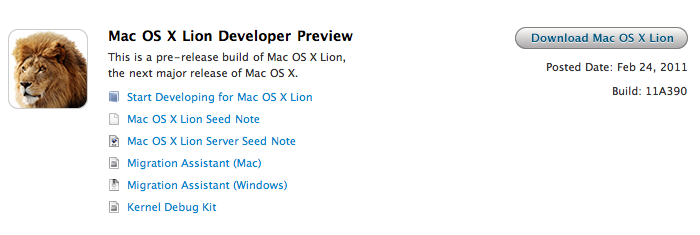Last week, Apple released the first developer preview of Mac OS X Lion. New and improved OS aside, something set apart Lion from the previous beta releases Apple seeded in the past years: Lion needs to be downloaded through the Mac App Store. That’s right: a 3.6 GB download, available for developers in the App Store infrastructure. How did this happen? Well, the how is easily explainable: developers can log in the Dev Center, request a Lion build and a unique promo code is generated. With the promo code, developers can fire up the Mac App Store and start the OS X Lion installer download. The promo code, as an additional security measure to prevent people from sharing it, can only be used once, on a single machine.
While the method is really clever and brings a bit of fresh air to the developer community (no need to have a download in your browser, you can just leave the Mac App Store do its job), this has raised some questions on the future of Apple’s OS downloads for consumers. Namely, some people are speculating the Lion developer preview is clearly pointing to a summer 2011 featuring Mac OS X 10.7 Lion available only in digital format. Apple is killing the CD, and physical Mac OS purchases.
There is no doubt the future is all about digital goods and the App Store, but I have mixed feelings about Lion going Mac App Store-exclusive. Rather, I can see Apple experimenting with this App Store distribution method this summer by releasing Lion both in physical and digital formats, with a small discount available for those who choose to go the Mac App Store way with no need for a DVD.
The problem: not everyone on this planet has access to fast internet connections. Yes, most people do and I do as well. But there’s a high percentage of users who would have second thoughts on being forced to download a 4 GB installer, not to mention those with a nice data cap their from Internet service provider. For some people (dare I say “many people”), the digital-only approach could easily become a problem. Plus, digital-only brings some inconveniences with it: download speed, canceled downloads.
But Apple is always looking forward, ahead of the competition. Lion “available in the Mac App Store” could be a nice tagline to put on Apple.com in a few months. And Apple would love to heavily promote the OS upgrade in the place Mac users go to buy new software. Hell, I could even see Apple promoting Lion in the iOS App Store with a link back to the Mac App Store, if necessary. Looking at last week’s release and Apple’s inevitable move to the App Store ecosystem (iWork, Aperture, Apple Remote Desktop, iLife – do they ring a bell?), it all starts making sense now.
I’m not saying Apple shouldn’t kill the physical OS distribution because of the possible problems with some users. Even MobileMe is going digital-only, with retail packages being trashed as we speak. I’m just saying that, considering Apple’s iterative process and philosophy, there’s a chance this summer we’ll see Lion available both in the Mac App Store and Apple Retail Stores. After all, Lion isn’t MobileMe, something that can easily go away from an Apple Store and most people won’t even notice. Lion could use the extra promotion from the physical stores and, why not, the comfort of a deep explanation and demo from an Apple employee. Also: we predicted iWork’s premature demise ahead of the Mac App Store and that hasn’t happened yet. iWork is still available both in the digital store and the physical one. Why would Apple need to rush the “transition process” with Lion this summer?
The path to digital OS downloads is clear, but the speed we’ll be running down this path is unknown at this point. Looking at least week’s MacBook Pro refresh, it’s also clear that we’re going to have to deal with the CD a little longer than expected: rumors pointed to new MacBook Pro lacking the SuperDrive, but there it is.
So what we have here is a company playing around with the idea of digital downloads and the removal of physical installations. Look at the big picture: on one hand, we have the MacBook Airs dubbed “the next generation of MacBooks” lacking a SuperDrive. We have a Lion developer release being seeded through the Mac App Store, and Apple’s flagship applications available in the App Store as well, at a discounted price. On the other hand, though, there are new MacBook Pros still featuring an optical disc drive, Apple flagship applications still sold in a retail package option and rumors suggesting next year will be the year for completely new laptop computers.
Lion may be a good indication of Apple’s plans, but I wouldn’t be surprised to see a physical Lion box showing up at my doorstep this summer.


